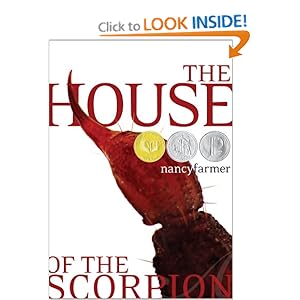Dystopian fiction. Matt Alacron was not born; he was harvested. He’s a clone with DNA from El Patron, druglord of a country between Mexico and the U.S. called Opium, where other clones called “eejits” work the poppy fields in mindless obedience and slavery. But Matt is different; El Patron wanted Matt to retain his intelligence and his ability to choose, for some reason.
 The House of the Scorpion won the National Book for Young People’s Literature in 2002 and was a Newbery Honor Book in 2003. I was fascinated by Matt’s fight for survival and by his oddly familiar world in which drug lords rule and people are enslaved by power-hungry dictators who long for riches and immortality. Would that all of those people who gain a little power would, rather than seeking after more and more, pray the prayer of Solomon:
The House of the Scorpion won the National Book for Young People’s Literature in 2002 and was a Newbery Honor Book in 2003. I was fascinated by Matt’s fight for survival and by his oddly familiar world in which drug lords rule and people are enslaved by power-hungry dictators who long for riches and immortality. Would that all of those people who gain a little power would, rather than seeking after more and more, pray the prayer of Solomon:
God: “Ask! What shall I give you?”
Solomon: “Therefore give to Your servant an understanding heart to judge Your people, that I may discern between good and evil. For who is able to judge this great people of Yours?”
God: “See, I have given you a wise and understanding heart, so that there has not been anyone like you before you, nor shall any like you arise after you. I have also given you what you have not asked: both riches and honor, so that there shall not be anyone like you among the kings all your days.”
I Kings 3
There is a God, and I am not He. To fear Him is the beginning of wisdom, and the characters in The House of the Scorpion needed desperately to hear and understand that lesson.
Other novels about human clones and cloning:
The Adoration of Jenna Fox by Mary Pearson.
Double Identity by Margaret Peterson Haddix.
Never Let Me Go by Kazuo Ishiguro.
The Boys from Brazil by Ira Levin.
Anna to the Infinite Power by Mildred Ames.
I think I’ve tried to read this one before (or wait, maybe that was The Ear, the Eye, and the Arm). Anyway, it would probably be more palatable to me now that I’ve come to appreciate dystopian fiction more than ever. 😉
Pingback: Sunday Salon: Books Read in March, 2012 » Semicolon